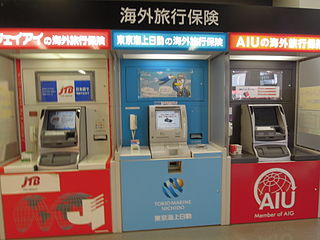
Insurance is a means of protection from financial loss. It is a form of risk management, primarily used to hedge against the risk of a contingent or uncertain loss.
Marketing is the process of intentionally stimulating demand for and purchases of goods and services; potentially including selection of a target audience; selection of certain attributes or themes to emphasize in advertising; operation of advertising campaigns; attendance at trade shows and public events; design of products and packaging to be more attractive to buyers; selection of the terms of sale, such as price, discounts, warranty, and return policy; product placement in media or with people believed to influence the buying habits of others; agreements with retailers, wholesale distributors, or resellers; and attempts to create awareness of, loyalty to, and positive feelings about a brand. Marketing is typically conducted by the seller, typically a retailer or manufacturer. Sometimes tasks are contracted to a dedicated marketing firm or advertising agency. More rarely, a trade association or government agency advertises on behalf of an entire industry or locality, often a specific type of food, food from a specific area, or a city or region as a tourism destination.
Sales promotion is one of the elements of the promotional mix. The primary elements in the promotional mix are advertising, personal selling, direct marketing and publicity/public relations. Sales promotion uses both media and non-media marketing communications for a pre-determined, limited time to increase consumer demand, stimulate market demand or improve product availability. Examples include contests, coupons, freebies, loss leaders, point of purchase displays, premiums, prizes, product samples, and rebates.

Pricing is the process whereby a business sets the price at which it will sell its products and services, and may be part of the business's marketing plan. In setting prices, the business will take into account the price at which it could acquire the goods, the manufacturing cost, the marketplace, competition, market condition, brand, and quality of product.

Life insurance is a contract between an insurance policy holder and an insurer or assurer, where the insurer promises to pay a designated beneficiary a sum of money upon the death of an insured person. Depending on the contract, other events such as terminal illness or critical illness can also trigger payment. The policy holder typically pays a premium, either regularly or as one lump sum. The benefits may include other expenses, such as funeral expenses.
Term life insurance or term assurance is life insurance that provides coverage at a fixed rate of payments for a limited period of time, the relevant term. After that period expires, coverage at the previous rate of premiums is no longer guaranteed and the client must either forgo coverage or potentially obtain further coverage with different payments or conditions. If the life insured dies during the term, the death benefit will be paid to the beneficiary. Term insurance is typically the least expensive way to purchase a substantial death benefit on a coverage amount per premium dollar basis over a specific period of time.
Home insurance, also commonly called homeowner's insurance, is a type of property insurance that covers a private residence. It is an insurance policy that combines various personal insurance protections, which can include losses occurring to one's home, its contents, loss of use, or loss of other personal possessions of the homeowner, as well as liability insurance for accidents that may happen at the home or at the hands of the homeowner within the policy territory.
Underwriting (UW) services are provided by some large financial institutions, such as banks, insurance companies and investment houses, whereby they guarantee payment in case of damage or financial loss and accept the financial risk for liability arising from such guarantee. An underwriting arrangement may be created in a number of situations including insurance, issues of security in a public offering, and bank lending, among others. The person or institution that agrees to sell a minimum number of securities of the company for commission is called the Underwriter.

An advertising campaign is a series of advertisement messages that share a single idea and theme which make up an integrated marketing communication (IMC). An IMC is a platform in which a group of people can group their ideas, beliefs, and concepts into one large media base. Advertising campaigns utilize diverse media channels over a particular time frame and target identified audiences.
A rebate is a form of buying discount and is an amount paid by way of reduction, return, or refund that is paid retrospectively. It is a type of sales promotion that marketers use primarily as incentives or supplements to product sales. Rebates are also used as a means of enticing price-sensitive consumers into purchasing a product. The mail-in rebate (MIR) is the most common. A MIR entitles the buyer to mail in a coupon, receipt, and barcode in order to receive a check for a particular amount, depending on the particular product, time, and often place of purchase. Rebates are offered by either the retailer or the product manufacturer. Large stores often work in conjunction with manufacturers, usually requiring two or sometimes three separate rebates for each item, and sometimes are valid only at a single store. Rebate forms and special receipts are sometimes printed by the cash register at time of purchase on a separate receipt or available online for download. In some cases, the rebate may be available immediately, in which case it is referred to as an instant rebate. Some rebate programs offer several payout options to consumers, including a paper check, a prepaid card that can be spent immediately without a trip to the bank, or even as a PayPal payout.
The term replacement cost or replacement value refers to the amount that an entity would have to pay to replace an asset at the present time, according to its current worth.

Travel insurance is an insurance product for covering unforeseen losses incurred while travelling, either internationally or domestically. Basic policies generally only cover emergency medical expenses while overseas, while comprehensive policies typically include coverage for trip cancellation, lost luggage, flight delays, public liability, and other expenses.
Group insurance is an insurance that covers a group of people, for example the members of a society or professional association, or the employees of a particular employer for the purpose of taking insurance. Group coverage can help reduce the problem of adverse selection by creating a pool of people eligible to purchase insurance who belong to the group for reasons other than the wish to buy insurance. Grouping individuals together allows insurance companies to give lower rates to companies, "Providing large volume of business to insurance companies gives us greater bargaining power for clients, resulting in cheaper group rates."
Premium financing is the lending of funds to a person or company to cover the cost of an insurance premium. Premium finance loans are often provided by a third party finance entity known as a premium financing company; however insurance companies and insurance brokerages occasionally provide premium financing services through premium finance platforms. Premium financing is mainly devoted to financing life insurance which differs from property and casualty insurance.

Once the strategic plan is in place, retail managers turn to the more managerial aspects of planning. A retail mix is devised for the purpose of coordinating day-to-day tactical decisions. The retail marketing mix typically consists of six broad decision layers including product decisions, place decisions, promotion, price, personnel and presentation. The retail mix is loosely based on the marketing mix, but has been expanded and modified in line with the unique needs of the retail context. A number of scholars have argued for an expanded marketing, mix with the inclusion of two new Ps, namely, Personnel and Presentation since these contribute to the customer's unique retail experience and are the principal basis for retail differentiation. Yet other scholars argue that the Retail Format should be included. The modified retail marketing mix that is most commonly cited in textbooks is often called the 6 Ps of retailing.
Trade credit insurance, business credit insurance, export credit insurance, or credit insurance is an insurance policy and a risk management product offered by private insurance companies and governmental export credit agencies to business entities wishing to protect their accounts receivable from loss due to credit risks such as protracted default, insolvency or bankruptcy. This insurance product is a type of property and casualty insurance, and should not be confused with such products as credit life or credit disability insurance, which individuals obtain to protect against the risk of loss of income needed to pay debts. Trade credit insurance can include a component of political risk insurance which is offered by the same insurers to insure the risk of non-payment by foreign buyers due to currency issues, political unrest, expropriation etc.
A risk management information system (RMIS) is an information system that assists in consolidating property values, claims, policy, and exposure information and providing the tracking and management reporting capabilities to enable the user to monitor and control the overall cost of risk management.
Weather insurance insures against weather variations. There are two insurable types of weather insurance: conditional weather insurance and weather cancellation insurance.
In insurance policies, an additional insured is a person or organization who enjoys the benefits of being insured under an insurance policy, in addition to whoever originally purchased the insurance policy. The term generally applies within liability insurance and property insurance, but is an element of other policies as well. Most often it applies where the original named insured needs to provide insurance coverage to additional parties so that they enjoy protection from a new risk that arises out of the original named insured's conduct or operations. An additional insured often gains this status by means of an endorsement added to the policy which either identifies the additional party by name or by a general description contained in a "blanket additional insured endorsement".
Marketing spending is an organization's total expenditure on marketing activities. This typically includes advertising and non-price promotion. It sometimes includes sales force spending and may also include price promotions. In a survey of nearly 200 senior marketing managers, 52 percent responded that they found the "marketing spending" metric very useful.





